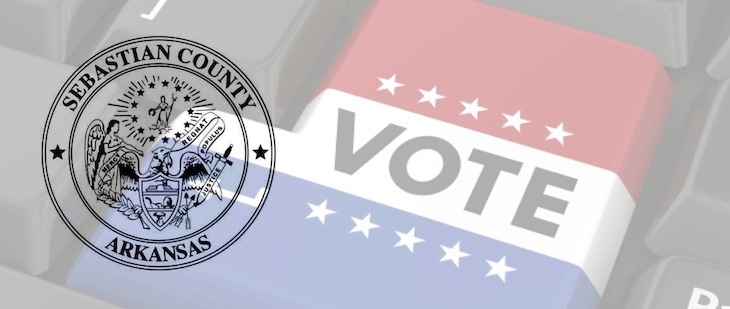Sebastian County Treasurer’s automation funds focus of candidate debate
by April 25, 2018 6:22 am 757 views

Sebastian County Collector/Treasurer candidate Steve Hotz took aim at incumbent Judith Miller’s management of excess commission funds at a Tuesday (April 24) debate hosted by the Sebastian County Republican Women.
Miller argued the 10% maximum amount of gross commissions she is allowed to take for use in Collector and Treasurer automation funds is permitted by law, but for Hotz, the argument “is not to the legality of it.”
Hotz, the Sebastian County Human Resources Director, said Miller had carried over $1.8 million in excess funds from 2017 to 2018. The larger Washington County, by comparison, carried over $519,738 during the same period. Craighead County, which is more in line with Sebastian’s overall size, brought over $458,789. Hotz said “about 70%” of the $1.857 million total spread between the two accounts ($697,245 in Treasurer’s, $1.159 million in Collector’s) could have gone “to the schools in Sebastian County” as well as the “cities, towns, and the county.”
Miller’s funds accumulated from a carry-over of $679,186 in 2009, when she first took office, and grew to where it is now with one dip from $1.076 million to $741,822 from 2011 to 2012, respectively. The dip was due to Miller providing $505,000 for purchase of the county’s financial software system, which, at the time, she had planned to use. As Treasurer, she now operates an independent system from the rest of the county at what she said was an extra cost of $8,000 per year compared to the county’s system, which is $85,000 annually for “Human Resources, finance, and purchasing only.”
Miller said Tyler, the provider handling the rest of the county, was unable to provide a system customized for the Treasurer’s department and she pursued a “custom-made system” after 16 months of “trying to be a team player” and providing the funding.
THE SCHOOLS QUESTION
Fort Smith Public School (FSPS) officials are pursuing a 5.558-mill increase to help fund $120.822 million in safety/technology enhancements and new construction. An audience member at Tuesday’s debate asked Miller how she justified not providing more to the district when the excess funds are beyond the amount needed to run her two departments.
Miller said the amount that would go to the schools would be “a drop in the bucket” to the millage.
“I’ve talked to the school about it, and they understand it’s a law that gives me the right to do this. We talked to them just this week. I said, ‘If I gave you part of the million dollars — say, you get $700,000 — and they said it wouldn’t even be a drop in the bucket. ‘It wouldn’t help us get started.'”
Miller did not specify the district personnel she spoke to, but Talk Business & Politics has asked the district to provide details of that communication as well as what uses they would have for $700,000 beyond the millage and will follow up upon receiving a response.
LEGAL GROUNDS
Miller stood by the restriction of funds, pointing to Arkansas Code Annotated 21-6-305(2)(A), which states that “The county collector may set aside up to ten percent (10%) of the gross commissions collected annually to be credited to the county collector’s automation fund.” In 2003, the Arkansas Legislature liberalized that to include the terms “to operate the office of county collector” and “for administrative costs.”
In other words, notes the Association of Arkansas Counties, “The new language of this law is very broad in nature.” However, “the law concerning the establishment of a County Collector’s Automation Fund is permissive in nature – the collector may choose whether or not to establish the fund and whether or not to keep funding it.”
The same goes for the Treasurer’s automation fund, with one notable exception. While funds from the Collector’s automation fund can be transferred to the general fund, funds from the Treasurer’s cannot. Miller argued she would be breaking the law by doing anything with that money outside of her department. While true, Hotz said “the act says we may accumulate, it doesn’t say you have to.” He added “there’s another way around it.”
“Spend more out of the automation fund and less out of the commission fund and that’ll get it back to the schools or the towns,” Hotz said.
